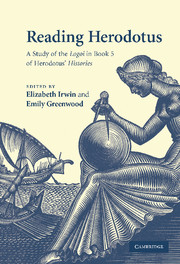Book contents
- Frontmatter
- Contents
- Acknowledgements
- List of contributors
- List of abbreviations
- Introduction: reading Herodotus, reading Book 5
- Chapter 1 ‘What's in a name?’ and exploring the comparable: onomastics, ethnography, and kratos in Thrace, (5.1–2 and 3–10)
- Chapter 2 The Paeonians (5.11–16)
- Chapter 3 Narrating ambiguity: murder and Macedonian allegiance (5.17–22)
- Chapter 4 Bridging the narrative (5.23–7)
- Chapter 5 The trouble with the Ionians: Herodotus and the beginning of the Ionian Revolt (5.28–38.1)
- Chapter 6 The Dorieus episode and the Ionian Revolt (5.42–8)
- Chapter 7 Aristagoras (5.49–55, 97)
- Chapter 8 Structure and significance (5.55–69)
- Chapter 9 Athens and Aegina (5.82–9)
- Chapter 10 ‘Saving’ Greece from the ‘ignominy’ of tyranny? The ‘famous’ and ‘wonderful’ speech of Socles (5.92)
- Chapter 11 Cyprus and Onesilus: an interlude of freedom (5.104, 108–16)
- Chapter 12 ‘The Fourth Dorian Invasion’ and ‘The Ionian Revolt’ (5.76–126)
- Bibliography
- Index locorum
- General index
Chapter 11 - Cyprus and Onesilus: an interlude of freedom (5.104, 108–16)
Published online by Cambridge University Press: 22 September 2009
- Frontmatter
- Contents
- Acknowledgements
- List of contributors
- List of abbreviations
- Introduction: reading Herodotus, reading Book 5
- Chapter 1 ‘What's in a name?’ and exploring the comparable: onomastics, ethnography, and kratos in Thrace, (5.1–2 and 3–10)
- Chapter 2 The Paeonians (5.11–16)
- Chapter 3 Narrating ambiguity: murder and Macedonian allegiance (5.17–22)
- Chapter 4 Bridging the narrative (5.23–7)
- Chapter 5 The trouble with the Ionians: Herodotus and the beginning of the Ionian Revolt (5.28–38.1)
- Chapter 6 The Dorieus episode and the Ionian Revolt (5.42–8)
- Chapter 7 Aristagoras (5.49–55, 97)
- Chapter 8 Structure and significance (5.55–69)
- Chapter 9 Athens and Aegina (5.82–9)
- Chapter 10 ‘Saving’ Greece from the ‘ignominy’ of tyranny? The ‘famous’ and ‘wonderful’ speech of Socles (5.92)
- Chapter 11 Cyprus and Onesilus: an interlude of freedom (5.104, 108–16)
- Chapter 12 ‘The Fourth Dorian Invasion’ and ‘The Ionian Revolt’ (5.76–126)
- Bibliography
- Index locorum
- General index
Summary
In his De Herodoti malignitate (24), Plutarch accuses Herodotus of not treating all the military exploits that he describes with equal interest. He complains that some of the events are narrated in meticulous detail while others are simply omitted. The Ionian revolt is a case in point: for Plutarch it provides an example of Herodotus' mistaken evaluation, and even suppression, of individuals, whole peoples, and events. In general, Plutarch characterizes Herodotus' treatment of the revolt (τ⋯ περ⋯ Σ⋯ρδεις) as demeaning, epitomized by Herodotus dubbing the Athenian ships sent to liberate the Greek cities of Ionia as the ‘beginning of evils’:
ὡς ⋯ν⋯ν μ⋯λιστα δι⋯λυσε κα⋯ διελυμ⋯νατο τ⋯ν πρ⋯ξιν, ἃς μ⋯ν Ἀθηναῖοι να⋯ς ⋯ξ⋯πεμψαν Ἴωσι τιμωροὺς ⋯ποστ⋯σι βασιλ⋯ως, ⋯ρχεκ⋯κους τολμ⋯σας προσειπεῖν ὅτι τοσα⋯τας π⋯λεις κα⋯ τηλικα⋯τας Ἕλλην⋯δας ⋯λευθερο⋯ν ⋯πεχε⋯ρησαν ⋯π⋯ τ⋯ν βαρβ⋯ρων.
He did all in his power to destroy and demean the deed, having the nerve to say that the ships which the Athenians sent to support the Ionians in their rebellion against the king were ‘the beginning of evil’ because they attempted to free all those fine Greek cities.
(4; tr. Bowen (1992))Of relevance for our discussion of Cyprus is Plutarch's complaint that crucial naval victories, such as that of the Eretrians over the Cypriots in the Pamphylian sea, have been entirely neglected. Here Herodotus is condemned for ‘mentioning the Eretrians casually and passing over their great epic achievement in silence’ (Ἐρετρι⋯ων δ⋯ κομιδῇ μνησθε⋯ς ⋯ν παρ⋯ργῳ κα⋯ παρασιωπ⋯σας μ⋯γα κατ⋯ρθωμα κα⋯ ⋯ο⋯διμον, 24).
- Type
- Chapter
- Information
- Reading HerodotusA Study of the Logoi in Book 5 of Herodotus' Histories, pp. 269 - 288Publisher: Cambridge University PressPrint publication year: 2007
- 10
- Cited by

